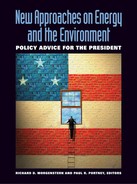Foreword
The policy recommendations in this collection were written in advance of the outcome of the 2004 presidential election, at a time when energy and the environment were campaign issues overmatched by economic and international developments. Although the two party platforms clearly differed in their approaches to energy and environmental policy, this book addresses a range of meritorious ideas that both presidential candidates might agree are worth serious consideration. The fact that we did not know who would be victorious—and thus could not skew our recommendations toward one candidate or the other—should give the ideas presented here even more credibility.
Moreover, the fact that the two of us jointly and enthusiastically commend this book to your attention is noteworthy. Although we have long liked and respected one another, and worked together to advance the work of Resources for the Future (RFF), we had diametrically opposite preferences in the presidential election. That we can agree on the usefulness of this policy manual (without necessarily endorsing every recommendation) is a true confirmation of bipartisanship.
This short volume presents constructive policy options in the form of memos to the president, whether reelected or new to his office, prepared by current and former members of the RFF research staff. We intend these short briefs, constrained to be no more than three or four printed pages, to provide grist for the president and his staff, as well as members of the legislative branch of government, as they seek actionable policies on energy and the environment immediately following the election.
Although this volume contains specific policy options made by scholars associated with RFF, it does not constitute the “official” views of the organization itself. Unlike a business trade association or an environmental advocacy group, RFF takes no institutional position on any legislative or regulatory policy matter. Rather, we employ economists and other policy analysts who want to do careful and high-quality research in the fields of energy, environment, and natural resources.
Of course, that does not restrain our research staff from drawing conclusions or offering detailed recommendations. In fact, they have been encouraged to do so in these pages, as they have done on many occasions when testifying before Congress or other deliberative groups. On those occasions, though, they have made clear that they are speaking for themselves and not for the organization that employs them. We recognize that this distinction may seem a fine one to many readers, but it is a defining principle to those of us associated with RFF.
A final observation: the memos in this book were prepared by members of the RFF staff, who were asked, “Based upon your own research and your knowledge of the work of others, what policy recommendation would you like to make to the next president?” We made it clear to our colleagues that they should not confine their recommendations to what the prevailing wisdom says is politically possible. Readers of this anthology will see ample evidence that they followed this advice!
| Robert E. Grady Chair, RFF Board of Directors | Frank E. Loy Vice Chair, RFF Board of Directors |
